| Srl | Item |
| 1 |
ID:
113385
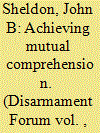

|
|
|
| 2 |
ID:
115968
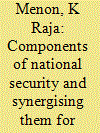

|
|
|
| 3 |
ID:
139190
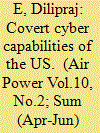

|
|
|
|
|
| Summary/Abstract |
Though declared as the global common by the world, it is an undeniable fact that internet technology was conceived, developed, and nurtured in the US during the second half of the 20th century. In other words, the US was the cradle for cyber technology, especially the internet, which is currently the backbone of the global communication network. In fact that, the internet is still indirectly governed by US laws which are secretly amended at times to be in tune with its national interest.
|
|
|
|
|
|
|
|
|
|
|
|
|
|
|
|
| 4 |
ID:
119248
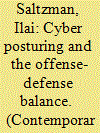

|
|
|
|
|
| Publication |
2013.
|
| Summary/Abstract |
For some realists, cyber warfare is 'old wine in new bottles', with marginal added value. This misses the larger possibilities for political/military chain reactions that cyber warfare may prompt, possibly leading to armed conflict. This article utilizes Offense-Defense theory to appraise the influence of cyber warfare on international security and the prospects for conflict. Offense-Defense theory, as applied here, better explains the relationship between technological innovation and international politics, and leads to different conclusions from other realist approaches. Redefining the Offense-Defense balance to accommodate cyberspace leads to an emphasis on the offensive advantages of cyber capabilities. The offensive and defensive cyber postures of China, Russia, the United States, and NATO are examined here to empirically assess the role of cyber warfare in security policy. Evidence shows that innovations in Information and Communication Technology (ICT) allow states to take greater risks and adopt more vigilant or offensive positions toward adversaries. Cyber capabilities do not cause armed conflict, but make decisions to escalate easier and cheaper. A strategic enabler that provides attackers greater freedom of action, cyber warfare is becoming a necessary condition for the conduct of war, even if it is not a sufficient one.
|
|
|
|
|
|
|
|
|
|
|
|
|
|
|
|
| 5 |
ID:
133995
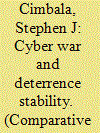

|
|
|
|
|
| Publication |
2014.
|
| Summary/Abstract |
Nuclear deterrence and cyber war are often discussed as separate worlds of research and military-strategic practice. To the contrary, a certain degree of overlap between nuclear deterrence and cyber conflicts is a plausible expectation for several reasons. First, future deterrent challenges will include regional nuclear arms races accompanied by competition in information technology and other aspects of advanced conventional command-control and precision strike systems. Second, cyber-attacks may be used against opposed nuclear command-control systems and weapons platforms as well as against infrastructure for the purpose of mass disruption during a crisis or war. Third, cyber capabilities support escalation dominance or escalation control, depending on the objectives of states and on the transparency of identification for cyber friends and foes.
|
|
|
|
|
|
|
|
|
|
|
|
|
|
|
|
| 6 |
ID:
123391
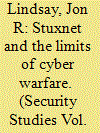

|
|
|
|
|
| Publication |
2013.
|
| Summary/Abstract |
Stuxnet, the computer worm which disrupted Iranian nuclear enrichment in 2010, is the first instance of a computer network attack known to cause physical damage across international boundaries. Some have described Stuxnet as the harbinger of a new form of warfare that threatens even the strongest military powers. The influential but largely untested Cyber Revolution thesis holds that the internet gives militarily weaker actors asymmetric advantages, that offense is becoming easier while defense is growing harder, and that the attacker's anonymity undermines deterrence. However, the empirical facts of Stuxnet support an opposite interpretation; cyber capabilities can marginally enhance the power of stronger over weaker actors, the complexity of weaponization makes cyber offense less easy and defense more feasible than generally appreciated, and cyber options are most attractive when deterrence is intact. Stuxnet suggests that considerable social and technical uncertainties associated with cyber operations may significantly blunt their revolutionary potential.
|
|
|
|
|
|
|
|
|
|
|
|
|
|
|
|